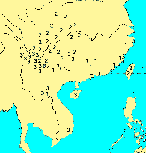 Distribution; K. evelyniana collections numbered "3" (2). | Keteleeria evelyniana Masters 1903Common NamesYunnan youshan (Chinese) (1); Du sam, May hinh (Vietnamese) (3).Taxonomic notesSyn: K. delavayi Van Tieghem 1891; K. dopiana Flous 1936; K. roulletii Flous 1936; K. hainanensis Chun et Tsiang 1963; K. eve1yniana var. pendula Hsueh 1983 (2). Farjon (2) provides a thorough taxonomic review of the species.DescriptionSee (1).RangeLaos, Vietnam (as far south as the Plateau of Langbian near Dalat), and China: SW Sichuan, Yunnan (where it probably intergrades with K. davidiana), and the central mountains of Hainan (1).It grows NW Vietnam at elevations above 600 m and is shade intolerant, prefers neutral or limestone soils, and is typically associated with Pinus spp. or with species of Fagaceace and Lauraceae, in some places being the dominant species (3). Big TreeOldestDendrochronologyEthnobotanyUsed in construction, railroad ties, mine timbering and sundry house implements. The seeds are rich in essential oil that can be used for burning and soap manufacturing. The tree can also be used in medicine (4).ObservationsI have no definite information on this, but judging from the species' ecological requirements and the distribution of historical collections (2), I suspect that it can be found in some of the forest preserves of the Dali - Lijiang area of Yunnan, and perhaps in more northerly preserves in Sichuan such as Hailuogou Glacier Park in the Daxue Shan. All of these areas are relatively accessible in the political and logistic senses.RemarksListed (as K. roulletii) as threatened in Vietnam by the World Conservation Monitoring Centre.Citations(1) Farjon 1990.(2) Farjon 1989. (3) Forest Inventory and Planning Institute 1996 (as K. davidiana). (4) Wang 1961. See also: |
[Keteleeria] [Pinaceae] [home] This page is from the Gymnosperm Database |